

How Data Literate Is Your Company? As companies rely more and more on data, and it creeps into more parts of business, data literacy is a skill that everyone has to have now.
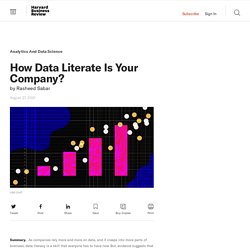
But, evidence suggests that most companies are still struggling to build this skill, even after they’ve identified... We have all read stories of facial recognition software that fails to recognize dark-skinned faces, or robo-loan officers that deny mortgages to certain groups. As a growing body of research has made clear, algorithms created by non-representative groups have resulted in AI that perpetuates the inequities already prevalent in our society.
Decisions, not data, should drive analytics programs. From the board room to the conference room, the mantra is data-driven decision-making — the idea of harnessing powerful computing resources, advanced analytics, and burgeoning data stores to augment human brain power and initiate smarter decisions.
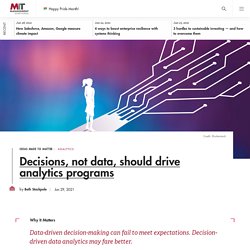
Yet for all the talk and corporate budgets directed to data initiatives, there has been disappointment in analytics programs. An Accenture survey found that only 32% of companies reported realizing tangible and measurable value from data. It begs the question: Why are such substantial efforts yet to produce measurable results? Bart de Langhe and Stefano Puntoni may have the answer, explored in a new MIT Sloan Management Review webinar and in the article “Leading with decision-driven data analytics.”
De Langhe and Puntoni contend that most companies take a backwards approach to data and analytics, focused on finding a purpose for data on hand or trying to extract value from available data. When an Educated Guess Beats Data Analysis. Looking forward 5 tech trends shaping 2021. Accepté - Série Cybersécurité et travail à distance - Surveillance des employés : mode d’emploi. Rejeté - Compensation Metrics HR Professionals and Managers Need to Know. At a time when the economic fallout from the COVID-19 pandemic is creating uncertainty, it is also flattening wage growth.
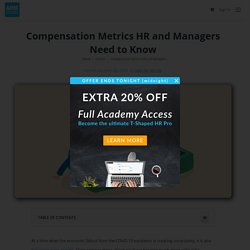
Open conversations about pay have become much more critical for employee engagement and productivity. In response, many companies are reworking their compensation philosophy and policies or planning to do so. Accepté - Épisode La surveillance guette le télétravail - Travailler mieux. SBy - Vidéos AIHR sur le RH numérique. Rejeté - Bias creeps into reference checks, so is it time to ditch them? As much as we’d like to think we’ve refined the hiring process over the years to carefully select the best candidate for the job, bias still creeps in.
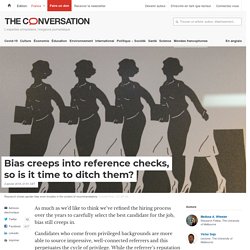
Candidates who come from privileged backgrounds are more able to source impressive, well-connected referrers and this perpetuates the cycle of privilege. While the referrer’s reputation and personal clout make up one aspect of the recommendation, what they actually say - the content - completes the picture. Research: Unconscious bias is keeping women out of senior roles, but we can get around it Research shows gender bias even invades in the content of recommendations.
Complément - Predictive algorithms are no better at telling the future than a crystal ball. An increasing number of businesses invest in advanced technologies that can help them forecast the future of their workforce and gain a competitive advantage.
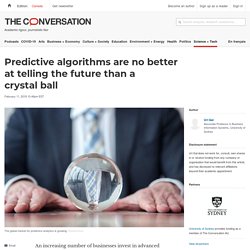
Many analysts and professional practitioners believe that, with enough data, algorithms embedded in People Analytics (PA) applications can predict all aspects of employee behavior: from productivity, to engagement, to interactions and emotional states. Read more: Digital public: looking at what algorithms actually do Predictive analytics powered by algorithms are designed to help managers make decisions that favourably impact the bottom line. Rejeté - This man was fired by a computer – real AI could have saved him. Ibrahim Diallo was allegedly fired by a machine.
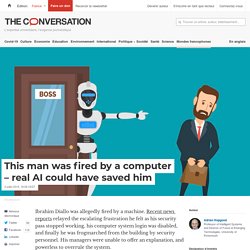
Recent news reports relayed the escalating frustration he felt as his security pass stopped working, his computer system login was disabled, and finally he was frogmarched from the building by security personnel. His managers were unable to offer an explanation, and powerless to overrule the system. Some might think this was a taste of things to come as artificial intelligence is given more power over our lives. Accepté - How People Analytics Can Help You Change Process, Culture, and Strategy. Accepté - The New Employee KPIs: How To Measure Productivity And Performance When Working Remotely. Aram Lulla is President, AF | HR | IT Divisions at Lucas Group.
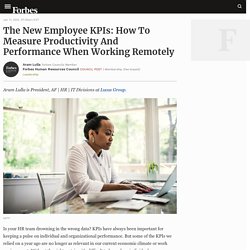
Is your HR team drowning in the wrong data? KPIs have always been important for keeping a pulse on individual and organizational performance. But some of the KPIs we relied on a year ago are no longer as relevant in our current economic climate or work environment. Accepté - 15 Effective Ways HR Teams Can Leverage Big Data. Big data analytics is a familiar concept in executive circles.
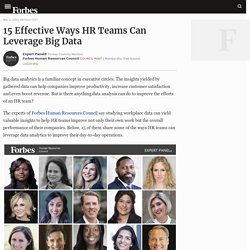
The insights yielded by gathered data can help companies improve productivity, increase customer satisfaction and even boost revenue. But is there anything data analysis can do to improve the efforts of an HR team? The experts of Forbes Human Resources Council say studying workplace data can yield valuable insights to help HR teams improve not only their own work but the overall performance of their companies. Accepté en complément - How data analytics could help your HR department operate more effectively in 2021 - Inside HR. Using technology to engage more effectively with employees can help to boost morale and productivity, writes Sailakshmi Baskaran, Product Consultant, ManageEngine.
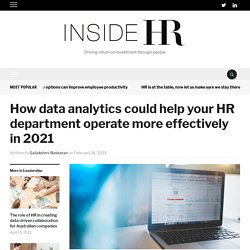
The past year has been a torrid one for many businesses – and HR professionals have been in the thick of it. They have helped employers implement remote working policies and kept communication channels open at a time of unprecedented disruption and uncertainty. And, as the economic downturn has continued to bite, they have tackled the difficult task of letting good people go. Great employee engagement makes tough assignments like these easier. Rejeté - Use Predictive Analytics to Calculate Turnover Risk. SBy - Décisions fondées sur les données : rôle de l’analytique dans l’établissement d’une stratégie directrice. Décisions fondées sur les données : rôle de l’analytique dans l’établissement d’une stratégie directrice. SBy-Workforce Readiness: The Learning Metric that Leads to Real ROI. If it wasn’t obvious before, the COVID-19 pandemic has reinforced the importance of organizational agility.
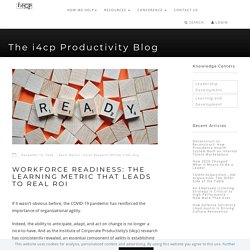
Indeed, the ability to anticipate, adapt, and act on change is no longer a nice-to-have. And as the Institute of Corporate Productivity’s (i4cp) research has consistently revealed, an essential component of agility is establishing and fostering a culture of continuous learning. This need for ongoing learning will continue to accelerate. Consider these two findings revealed in the latest World Economic Forum Future of Jobs Report (published in October 2020). The report asserts that by the year 2025: Complément - To Recognize Risks Earlier, Invest in Analytics. Rejeté - Predict What Employees Will Do Without Freaking Them Out. Accepté - How to Develop a Data-Savvy HR Department. How can senior leaders help HR develop a culture in which people think analytically?
The key is to provide engaging learning opportunities to workers at all levels of expertise. Keep analytically-savvy workers’ skills up-to-date by providing... To create an analytical culture in your organization, you need to nurture the right mindset among your employees. And that starts with creating a culture of analytics in your HR department. How can senior leaders help HR develop a culture in which people think analytically? Rejeté - Competing on Talent Analytics. Accepté - Is Your Company Using Employee Data Ethically? Accepté - Better People Analytics: Measure Who They Know, Not Just Who They Are.
“We have charts and graphs to back us up. So f*** off.” New hires in Google’s people analytics department began receiving a laptop sticker with that slogan a few years ago, when the group probably felt it needed to defend its work. Back then people analytics—using statistical insights from employee data to make talent management decisions—was still a provocative idea with plenty of skeptics who feared it might lead companies to reduce individuals to numbers. Complément Is HR the Most Analytics-Driven Function? Human resources has always had plenty of analytics potential, but new data suggests it has evolved into an analytics leader — even ahead of analytics-heavy disciplines like finance. 51% of HR respondents said that they could perform...
I have argued over the past decade that the Human Resources (HR) function has the potential to become one of the leaders in analytics. The key word, I thought, was potential. Not anymore. A recent global survey on which I collaborated with Oracle suggests that HR is right up there with the most analytical functions in business — and even a bit ahead of a quantitatively-oriented function like Finance. Accepté - HR Must Make People Analytics More User-Friendly.
Managing HR-related data is critical to any organization’s success. And yet, progress in HR analytics has been glacially slow. To improve this sorry record, organizations should be attuned to factors that can effectively “push” HR... Rejeté - Leveraging HR Analytics in Strategic Decisions. Human Resource leaders are urged to apply big data and predictive analytics to talent, leadership, and organizational capabilities. But too often, today’s HR analytics are mainly used for cost avoidance, not to drive broader strategic success. So how do leaders use better data and analysis to gain the long-sought strategic impact of human capital decisions? Rejeté - Workforce Analytics of the Future: Using Predictive Analytics to Forecast Talent Needs. Accepté - There’s No Such Thing as Big Data in HR. Accepté - Analytique RH.